- Home
- M. Louisa Locke
Scholarly Pursuits
Scholarly Pursuits Read online
Scholarly Pursuits
A Victorian San Francisco Mystery
M. Louisa Locke
This book is a work of fiction. Names, characters, places, and incidents are either the product of the author's imagination or are used fictitiously, and any resemblance to actual persons, living or dead, business establishments, events, or locales is entirely coincidental.
No part of this book may be reproduced in any form or by any electronic or mechanical means, including information storage and retrieval systems, without written permission from the author, except for the use of brief quotations in a book review.
Copyright © 2019 by Mary Louisa Locke
All rights reserved.
* * *
Cover design © 2019 Michelle Huffaker
All rights reserved.
“Something is rotten in the state of Berkeley”
--1881 Blue and Gold Yearbook, University of California: Berkeley
Contents
Chapter 1
Chapter 2
Chapter 3
Chapter 4
Chapter 5
Chapter 6
Chapter 7
Chapter 8
Chapter 9
Chapter 10
Chapter 11
Chapter 12
Chapter 13
Chapter 14
Chapter 15
Chapter 16
Chapter 17
Chapter 18
Chapter 19
Chapter 20
Chapter 21
Chapter 22
Chapter 23
Chapter 24
Chapter 25
Chapter 26
Chapter 27
Chapter 28
Chapter 29
Chapter 30
Chapter 31
Chapter 32
Chapter 33
Chapter 34
Chapter 35
Chapter 36
Chapter 37
Chapter 38
Chapter 39
Chapter 40
Chapter 41
Chapter 42
Chapter 43
Chapter 44
Chapter 45
Chapter 46
Chapter 47
Chapter 48
Epilogue
Author’s Notes
Other Works by Author
About the Author
Acknowledgments
Chapter 1
Early Morning, Saturday, January 1, 1881
Ashland, Nebraska
Four in the morning wasn’t early on a farm. Not even in the dead of a Nebraska winter. And the dark kitchen radiated with heat from the old-fashioned wood-burning range. Nevertheless, Caro Sutton could see the blankets around her younger cousin’s shoulders tremble from the uncontrollable shivering that had racked Grace ever since Caro found her half-buried in a snowbank.
Could her cousin have really intended to take her own life?
“Your uncle has gone to harness up the horses to take you to the train,” her aunt said quietly, coming to stand beside Caro in the kitchen doorway.
The old retriever, who sat next to Grace, looked up at the sound of a voice, then put his chin back down on Grace’s lap. Her cousin showed no sign that she’d heard her mother. Instead, Grace leaned forward in her chair, staring at the flames that flickered in the stove’s grate.
Caro’s aunt said, “My dear, I’ve heated some bricks for your feet, but mind you keep your head well covered. You should be at the station around dawn.”
“Thank you. If there aren’t any delays, I’ll arrive in California at the Berkeley station by Wednesday morning. I’ll send you a telegram as soon as I get settled in.”
“And write every day. Promise?”
Hearing the anxiety in her aunt’s voice, Caro said, “Every day. And I will let you be the judge of whether or not to read parts of my correspondence to Grace. But I expect to get frequent letters from you in return, honest ones. No trying to hide the truth about her condition from me.”
“Are you sure you should still go? I know the only reason you agreed to take classes at California’s university this spring was because Grace asked you to join her there. But now everything’s changed. Can’t you do more good for her by staying? What if you hadn’t been here when she ran out into the night?”
“We have been over all this. She has you, and Uncle, and her brothers, and old Jacko there, to watch over her. Something terrible happened to her at the university…and for some reason she can’t or won’t tell us what it was. You know me. I can’t just sit and wait and pray that she will recover fully on her own. Patience has never been my virtue. I need to find out what happened and who’s responsible.”
Sounds from the yard told Caro that the wagon had pulled up, and the door to the kitchen opened as her oldest cousin Bradley came in and picked up her large valise, which was standing by the back door. He glanced at his sister Grace, then over at Caro, and said gruffly, “I’ve put your trunk in the back of the wagon. Father said not to keep the horses standing.”
Caro made sure her hat was securely pinned, shrugged on her heavy wool coat, and was winding a scarf around her neck when her two other cousins came into the kitchen. Benny, the youngest, came over and gave her a big hug, while Josh, the middle one, shyly nodded and went to wrap up the hot bricks in a small blanket. Benny grabbed a basket that held enough food to get her at least through the first day of train travel.
The boys went outside, slamming the door behind them. Caro kissed her aunt, picked up her purse, and went over to Grace, who’d shrunk into herself at the entrance of her brothers.
Caro kneeled down in front of her cousin, taking one of her cold hands in hers, and said, “Grace, I’m off to Berkeley, as we planned. I’m hoping that in a few weeks you will feel enough better to come join me. But I will come back to you, if you want me here. You just need to say the word.”
Caro looked into her cousin’s face, searching for even the slightest hint that Grace heard her. But there was nothing. Just the dark blue eyes that looked right through her, as if she weren’t there.
She flashed on the memory of a poor rabbit she’d once found that had been pursued for miles by a local farmer’s hounds. The animal had sat shivering, staring at nothing. Suddenly it had keeled over, having died of fright.
Biting back a cry, Caro stood up, kissed her aunt good-bye, and went out into the darkness, determined to find the fiends who had frightened the life out of her sweet, kind, loving cousin.
When she found them, she would make them pay.
Chapter 2
Early Thursday morning, January 6, 1881
San Francisco, California
“The first boat of the Oakland Ferry leaves San Francisco at 6:10 A. M.” San Francisco Chronicle, January 4, 1881
“Kitty, where did you get that hat? Is it velvet? It frames your face so beautifully.” Laura Dawson leaned forward to better see her friend in the gloom of the enclosed carriage. The sun would be up by the time they got to the Berkeley train station and started to walk up to campus. However, at six-thirty, it was still dark out and the lamps at the front of the carriage only provided a feeble glow through the side windows. She didn’t need light to know that her friend, who sat across from her, was blushing, which Kitty did whenever anyone complimented her.
“It was a Christmas present from Father. He was so pleased this morning when he saw that I was going to wear it for the first day of the term.”
Kitty Blaine was a strikingly beautiful redhead, with a perfect heart-shaped face and emerald green eyes, and not a smidgeon of vanity about her appearance. She was only seventeen, the youngest of Laura’s friends, and her father was a former saloon keeper who’d clawed his way up through the
rough and tumble of San Francisco politics to become a powerful force in the Democratic Party and wealthy owner of the construction company that was helping to build the new City Hall. He was also a man who dearly loved his daughter, and as long as Kitty acted as hostess at his dinner parties, he pretty much let her do as she pleased.
Consequently, if it pleased her to work towards a bachelor’s degree in classics at the new University of California, he was glad to put his comfortable four-seater brougham at her and her friends’ disposal to take them to the Oakland ferry every day.
Once they arrived in Oakland, they would transfer to a special train that ran right past the University of California campus at Berkeley. The whole trip took a little over an hour, and Laura was looking forward to getting caught up with Kitty, since they hadn’t spent much time together over the Christmas holidays.
“Do the female students keep their hats on in the classroom?” asked Celia Beale, who was sitting next to Laura, nervously fingering the bunch of artificial pansies attached to the narrow brim of her own silk straw hat. “I wondered, since we took off our hats in the classroom when we taught. I thought maybe it was like going to church; men would take their hats off, but women would keep their hats on.”
Celia, like Laura, was three years older than Kitty, and Laura had met her last year when they both taught for the Clement Street elementary school. Celia hadn’t been able to start at the university in the fall with Laura and Kitty because she had needed to stay close to home to help nurse her mother, who’d become seriously ill. Laura knew that her friend found the whole idea of starting at Berkley halfway through the year a frightening proposition. But she had confessed to Laura last night that she feared that if she didn’t leave home now that her mother had died, she would never break free from her family’s demands. This was one of the reasons she had been so happy to accept Laura’s invitation to share her room in the O’Farrell Street boardinghouse where Laura lived with her brother Nate and his wife Annie.
Laura could help Celia with some of the school work she had missed by not starting in the fall, and the arrangement would save them both money, which Laura welcomed. She had had to cut her hours working as a typesetter nearly in half in order to attend the university.
Recognizing that her friend’s question about hats revealed how anxious Celia was about this first day of the term, Laura said, “At the university, we women keep our hats on, just like in church. And the way the color of the flowers on your hat matches your blue eyes is just lovely. However, wait until you see the disreputable state of the hats some of the boys wear on campus. They’d be ejected on the spot if they tried to enter any place of worship looking as they do. Then there are the ridiculous blue skull caps that the freshmen in our class have started wearing. Did Ned show you his?”
Ned Goodwin was Celia’s fiancé, and Laura continued to be puzzled by the fact that the charming and handsome Ned, who was the only son of a wealthy and prominent judge, had become engaged to her shy friend, who was the daughter of an Irish dairy farmer.
The carriage began to slow, and Kitty said, “Did you tell Mr. Timmons he should come inside and ride with us, Laura? It’s gotten so cold these mornings.”
Seth Timmons was the other friend who attended the university with them, and every morning the carriage stopped to pick him up at the corner of Sansome Street.
“Yes, but he demurred. Said he was more comfortable sitting up top.” Laura shrugged. “I think he doesn’t like being in a confined space…after all those years he spent outdoors, herding cattle.”
Laura suspected the real cause of Seth’s discomfort was the horrors he’d encountered in the Confederate-run Andersonville prison, where he spent the last months of the war. Horrors he refused to speak about, just as he wouldn’t talk about what had driven him to leave his family back east once the war was over and spend the next ten years working his way west as a cowboy.
What she did know was that during those years, he’d slowly educated himself, learned to run a printing press, and eventually ended up at San Jose Normal School, which was where Laura had met him.
She also knew that she could trust him with her life…had done so, in fact. But he was certainly a hard man to figure out.
Laura moved the leather curtain and leaned out of her side window and saw Seth standing under a gas lamp that threw his tall, broad-shouldered silhouette into stark relief. As he stepped down from the sidewalk, he glanced up at her from under his Stetson, his flint grey eyes glittering in the light from the carriage, his mouth in its usual grim line, framed by his black mustache. Then he nodded, giving her the swift amused smile that transformed his face, and she waved and smiled in return.
The carriage dipped slightly as he climbed up beside the driver and then jerked as the horses started off again for the last six blocks to the Oakland ferry.
Celia said, “My brothers are just the same…regular bulls in a china shop when they are in the house. But Mr. Timmons seemed quite comfortable yesterday when he came to have dinner at the boardinghouse. Does he come by very often?”
Kitty whispered, “What Celia actually wants to know is if he’s courting you, Laura. Well, Celia, we’d all like to know that.”
Laura sighed and said, “Celia, don’t listen to Kitty. Seth Timmons and I are just friends.”
“I’m sorry I teased, Laura,” Kitty said swiftly. “I swear, I don’t know how Mr. Timmons keeps up, with his job running a printing press and taking a full course load.”
Glad of the change in topic, Laura said, “I think he doesn’t sleep. I’m only putting in half the hours he is at my job setting type, and I’m having a difficult time keeping up. Be glad you saved enough so you don’t need to work this term, Celia.”
Kitty added, “You’ll get to know Mr. Timmons better this term, since he is taking the classics courses with us, while Ned and Laura are working toward their bachelors in literature.”
“But didn’t you say I will be taking some classes with Laura and Ned?” Celia asked, frowning.
Laura gave her friend a hug and said, “Don’t worry, all the freshmen in both the literary and classics departments take the English and mathematics classes at nine and ten. You will get to see Ned then. I promise.”
If he shows up.
Laura hadn’t had the heart to tell Celia how erratic Ned had been last term. Half the time he’d not made it to Kitty’s house in time to get a ride to the ferry, so he’d be late for the nine o’clock class, and he never seemed prepared for the recitations. In consequence, he’d failed his Latin examination at the end of fall term.
Ned said the long commute from the city was the reason he’d decided to move into his fraternity house this term. He argued that since the Zeta Psi house was just off campus, he’d have more time to study and no excuse to be late for classes.
Seth had just laughed when she told him what Ned said. He told her that, in his opinion, Ned was no different than most of the young men he’d met on campus, who only enrolled in the university so they had an excuse to leave home and spend their nights drinking and their days avoiding doing any serious work.
Laura seriously hoped he was wrong.
Chapter 3
Thursday Morning, January 6, 1881
Berkeley, California
“Today there is no class spirit. Except, to be sure, such spirit as is shown in an occasional cane-rush between the Sophs and Freshies.” 1881 Blue and Gold Yearbook
Seth Timmons watched as Laura Dawson and Kitty Blaine pointed out the sights to Celia Beale as they walked up the carriage road that rose from the western entrance of campus, just a couple of blocks from the Berkeley train station. There had been severe rain storms over the Christmas holidays, so the dirt road was muddy, and Strawberry Creek and its tributaries, which bracketed the campus, were running at full spate. Since it was now a quarter past eight in the morning, at least they weren’t having to make this trip up the hill in the dark.
He marveled at how adroitly the thre
e women kept their skirts from getting soiled, and he was reminded strongly of the delicate movements of a filly he once owned who hated getting her hooves wet. Miss Celia Beale seemed the most confident in her steps, which surprised him, given her shy, mousy demeanor. He’d only met her a few times, always under the shadow of Ned Goodwin, so perhaps his first impressions were inaccurate. Laura said Miss Beale’s family ran a dairy farm, so he guessed it stood to reason she’d be well acquainted with mud.
As for inaccurate first impressions, he’d initially assumed that Kitty Blaine, with her frequent blushes and fancy duds, was some flighty society miss who was marking time until marriage. He couldn’t have been more wrong. She was probably the most brilliant scholar among all the freshmen class. Wasn’t just that the most difficult passages of Livy and Homer were child’s play for her, but the mathematical language of algebraic equations and plane geometry, which continued to be a mystery to Seth, came as easily to her, as did Greek and Latin.
Then, of course, there was Laura. When he’d first met her at San Jose Normal School, he thought of her as coltish—awkward and immature. He’d quickly learned to appreciate that the awkwardness came from an enthusiasm for life that often led her to leap before looking and that the immaturity was simply inexperience. But when she stumbled or made mistakes, she got back up quickly, apologized, and, most importantly, learned from those mistakes.

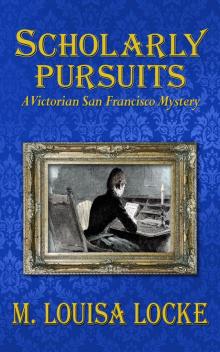 Scholarly Pursuits
Scholarly Pursuits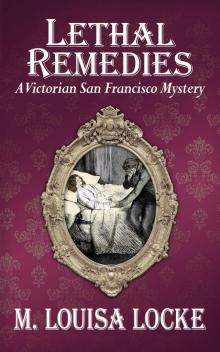 Lethal Remedies
Lethal Remedies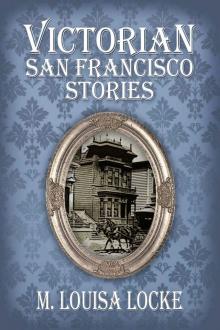 Victorian San Francisco Stories
Victorian San Francisco Stories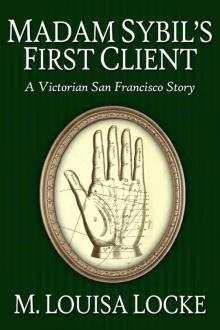 Madam Sibyl's First Client: A Victorian San Francisco Story
Madam Sibyl's First Client: A Victorian San Francisco Story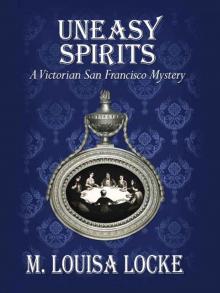 Uneasy Spirits: A Victorian San Francisco Mystery
Uneasy Spirits: A Victorian San Francisco Mystery Dandy Detects: A Victorian San Francisco Story
Dandy Detects: A Victorian San Francisco Story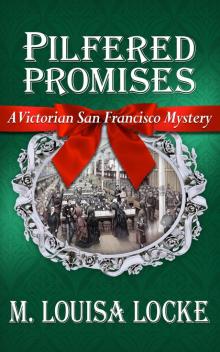 Pilfered Promises
Pilfered Promises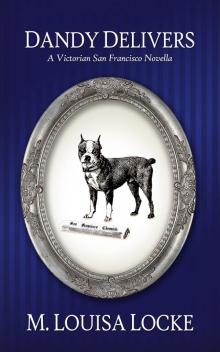 Dandy Delivers
Dandy Delivers Kathleen Catches a Killer
Kathleen Catches a Killer Violet Vanquishes a Villain
Violet Vanquishes a Villain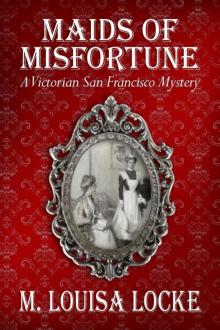 Maids of Misfortune: A Victorian San Francisco Mystery
Maids of Misfortune: A Victorian San Francisco Mystery